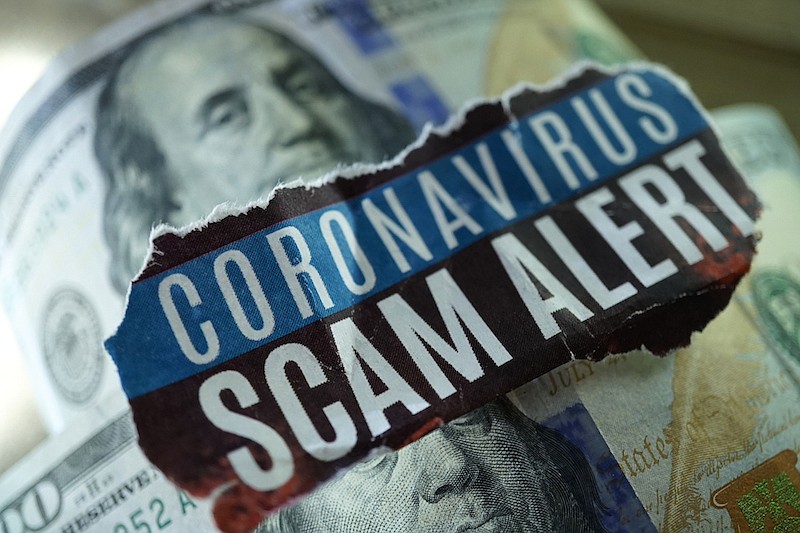I was honored to be contacted recently by The Motley Fool regarding its stance on how the coronavirus has resulted in the illnesses and even deaths, not only of people, but also of consumers' bank accounts. No, I don't necessarily mean the costs associated with the virus itself; instead, the schemes running rampant from some of our nastiest adversaries: scammers.
Anytime a frightening emergency rears its ugly head, folks (understandably) race toward most any so-called solution, regardless of the price tag and/or non-scientific claims. "Fool" is facing this nemesis head on with research and public notifications; hence, our mutual back scratching for today's column. (Folks looking to gain more information, go https://www.fool.com/the-ascent/coronavirus-resources/ to check daily updates of relief options, personal finances tips, and more.)
Scams have cost American consumers over $124 million (January 1-August 31), according to the Federal Trade Association (FTC), which has additionally received over 5.7 million COVID-related fraud complaints. This number is only the reported cases. And, once more, because we want so badly to find a panacea before we or our loved ones contract the coronavirus, we're more-than-tempted to throw caution to the wind.
It's crucial to remember Consumer Watch's advice for "regular" scams or ID theft that likewise applies to the virus so tuck teachings into your memory bank and defeat the creeps before they thrust their first foot inside your door!
* Don't click on emails with links to COVID-19 treatment, testing or vaccines. Should you receive an email trying to sell a testing kit, personal protective clothing, brand-new treatment, or vaccine, do not click on any links. On the other hand, if you do go that far, never, ever, ever enter your bank or credit card information for swindlers to see. Not only is no vaccine available, according to the true experts, but also a treatment for such is strictly experimental, and forget any test or "anecdote" purchasing over the Internet. Big. Double. No.
* Never reveal personal information over the phone to someone claiming to be from the CDC, asking if you have symptoms and requesting personal information like your bank account details or Social Security number to go along with it. The same holds true for hospitals and doctors - they never contact us on a random basis offering to prepay our medical bills if we're stricken by the virus.
* Use caution when donating to COVID-19 research or charities. Fake charities have popped up asking for money to use for coronavirus research and patient financial assistance. Resist Sammy Scammy's attempts to tug at your heartstrings with "anecdotes" (the story type, not the treatment sort) of patients painfully dying of the virus. As I've advised a number of times over the years, check out the legitimacy of charities by going online to Charity Navigator - not just if an organization is on the up-and-up, but percentages of how much of your and my donations are used for administration, for example, rather than how much goes into the care of its patients, if an applicable charity.
According to Nathan Hamilton, director and industry analyst at The Ascent, Motley Fool's investigation shows California with the most claims to the FTC with over $17 million, while Tennessee ranked No. 18 among the 50 states with over $5.5 million in claims submitted to federal regulators.
"As long as the pandemic is around, I don't see COVID or stimulus fraud decreasing." Hamilton said.
He further reports one of the best ways to protect ourselves from COVID-19 related scams is by knowing what the IRS and other government agencies will not do. (Again, this same info matches what I and others advise about IRS refunds but with a stimulus check instead; however, any type of warning allows identity theft as well – a much worse assault. So avoid like the plague revealing any personal material, including Social Security or bank account number, or any other sensitive info.) If Mr. or Ms. Scammy contacts us to claim we were overpaid, then obviously if we believe the dreaded IRS is calling, and we probably begin to exhibit all the symptoms of a person undergoing an anxiety attack.
Naturally, the caller is depending upon the recipients' panic. We're told one way to "reimburse" the alleged agency is to charge the amount to our credit cards. Please do not forget the IRS never initiates contact by phone, email, or social media and, in fact, only rarely does Uncle Sam show up at your front door. They won't demand a certain payment method nor ask for a debit or credit card number over the phone. Furthermore, the agency never insists upon immediate payment or threatens to call law enforcement. Finally, twinkle those baby blues to check your browser; official IRS web pages always start with irs.gov.
Contact Ellen Phillips at consumerwatch@timesfreepress.com. Information for this column also came from Brian Frey, public relations specialist at The Motley Fool/The Ascent, and Nathan Hamilton, director and industry analyst at The Ascent.
